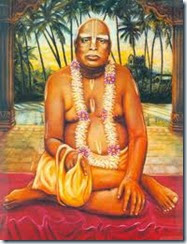
Srila Prabhupada
Therefore our duty is, mahājano yena gataḥ sa panthāḥ [Cc. Madhya 17.186]. "We have to accept that way which is given by the mahājana." Mahājana. So śāstra... We are sometimes in difficulty to find out the mahājana, who is mahājana. That mahājana is also described in the śāstras, who can be accepted the greatest authority, mahājana. That is stated in the Sixth Canto of Śrīmad-Bhāgavatam. Svayaṁbhur nāradaḥ śaṁbhuḥ [SB 6.3.20]. They are mahājanas. Svayambhuḥ means Brahmā. Brahmā is mahājana. Svayambhu, Nārada. Nārada Muni is mahājana. And Śambhu, Lord Śiva, he is also mahājana. Svayaṁbhur nāradaḥ śaṁbhuḥ kumāraḥ [SB 6.3.20], four Kumāras. Sanat-kumārādi, they are also mahājanas. Kapila, Kapiladeva who expounded that Sāṅkhya philosophy, Kapiladeva. He is incarnation of God. Kumāraḥ kapilo manuḥ.
Svayambhuva Manu, he is also authority. Manu's name is also mentioned in the Bhagavad-gītā. Imaṁ vivasvate yogaṁ proktavān aham avyayaṁ vivasvān manave prāhuḥ [Bg. 4.1]. So therefore Manu is also mahājana, he's authority. There is Manu-saṁhitā. Our Vedic system is conducted, the law, the law-giver is Manu. From Manu, the manuṣya, "man", these words have come, Manu. Descendant of Manu, human society, manuṣya.
So Prahlāda, Prahlāda Mahārāja is mahājana. Janaka, Janaka Mahārāja. Prahlādo janako bhīṣmaḥ, Bhīṣmadeva, grandfather Bhīṣmadeva, the grandfather of the Pāṇḍus. He is also mahājana. Prahlādo janako bhīṣmo baliḥ, Bali Mahārāja, he is mahājana. Vaiyāsakiḥ, Śukadeva Gosvāmī, and Yamarāja, he is also mahājana.
So we have to follow the footsteps of the mahājana. Otherwise we shall be bewildered. Kṛṣṇa therefore, He says, ṛṣibhir bahudhā gītam: "There are many saintly persons, great sages, and they have spoken in various ways." But Kṛṣṇa concludes, the Vedānta-sūtra. Vedānta-sūtra, He gives reference because this Vedānta-sūtra comes from the disciplic succession of Brahma. Brahma-sūtra. Lord Brahma, Kṛṣṇa instructed Brahma. Tene brahma hrdā ādi-kavaye [SB 1.1.1]. Ādi-kavi is Brahmā, and Kṛṣṇa instructed him. Tene brahma... Brahmā means Vedas. Śabda-brahma. The śabda-brahma was instructed to Lord Brahmā by Kṛṣṇa. Therefore Kṛṣṇa is the original guru.
Therefore Kṛṣṇa says in the Bhagavad-gītā, imaṁ vivasvate yogam proktavān aham: [Bg. 4.1] "This yoga system, Bhagavad-gītā yoga system, I first of all spoke to the sun-god." Vivasvān manave prāhuḥ. And the sun-god, whose name is Vivasvān, he spoke to his son Manu. Manur ikṣvākave 'bravīt. And Manu spoke to his son, Mahārāja Ikṣvāku. Mahārāja Ikṣvāku is coming from the dynasty of the sun-god Vivasvān. There are two kṣatriya families, one from the moon god, another, the sun-god. So Mahārāja Rāmacandra appeared in the family of the sūrya-vaṁśa, Ikṣvāku, Mahārāja Ikṣvāku.
So this is the paramparā system. And everything is described in the Brahma-sūtra by Vyāsadeva. Vyāsadeva happens to be the disciple of Nārada. Nārada happens to be disciple of Brahma. And from Vyāsadeva, Madhvācārya; then from Madhvācārya disciplic succession, Mādhavendra Purī. Mādhavendra Purī was the spiritual master of Īśvara Purī. Īśvara Purī was the spiritual master of Caitanya Mahāprabhu. Caitanya Mahāprabhu is the spiritual master of the Six Gosvāmīs of Vṛndāvana: rūpa sanātana bhaṭṭa raghunāth, śrī jīva gopāla bhaṭṭa dāsa raghunāth. So from the Gosvāmīs, then Kavirāja Gosvāmī, Viśvanāth Cakravārtī Ṭhākura, then Jagannāth dās Bābājī, then Bhaktivinoda Ṭhākura, Gaura-Kiśora dāsa Bābājī, Bhaktisiddhānta Sārasvatī. And we are servant of Bhaktisiddhānta. So there is a disciplic succession.
That paramparā should be followed. Evaṁ paramparā-prāptam imaṁ rājarṣayo viduḥ [Bg. 4.2]. If we want to understand really Vedic literature, then we must follow the paramparā system. There are four sampradāyas, paramparā: the Rāmanuja Sampradāya, Madhvācārya Sampradāya, Viṣṇu Svāmī Sampradāya, Nimbārka Sampradāya. So we belong to the Madhvācārya Sampradāya. Fortunately, all these ācāryas, even Śaṅkarācārya, they appeared from South India. This sampradāya, ācārya-sampradāya, is going on all over India. So every sampradāya has got his commentary on the Brahma-sūtra. Therefore Kṛṣṇa says here, brahma sūtra-padaiś caiva hetumadbhir viniścitaiḥ [Bg. 13.5]. Unless a sampradāya, the four sampradāyas, they do not comment on the Brahma-sūtra, he'll not..., that sampradāya is not accepted. And if you do not accept the sampradāya..., sampradāya-vihīnā ye mantrās te niṣphalā matāḥ.
If you do not take your initiation mantra from the sampradāya, then it is useless. Now, there are so many apasampradāya. They do not come in disciplic succession, but becomes guru, teacher. Therefore everything is topsy-turvied. Nobody has got fixed idea what is God. Everyone has created his own philosophy. The whole thing is now confused.
http://prabhupadabooks.com/classes/bg/13/8-12/bombay/september/30/1973




